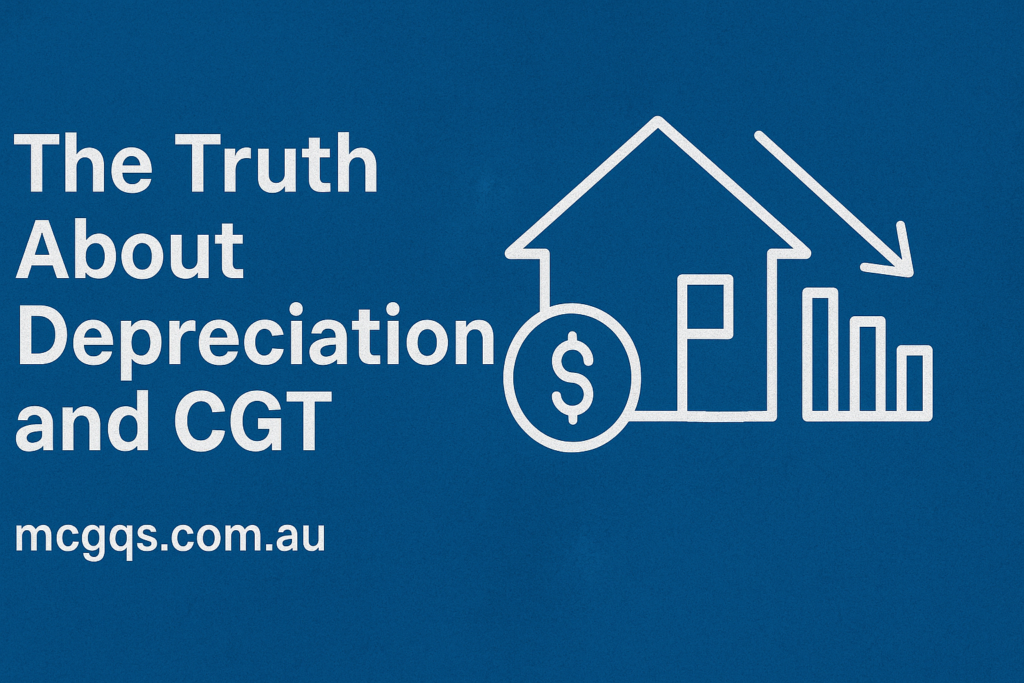The truth about depreciation and CGT

There are plenty of quandaries swirling around the zeitgeist which confound me. For example, what university course should I take to become a millionaire ‘influencer’? Also, why wasn’t our national anthem composed by a sweat-drenched, pub-rock band from Adelaide?
Big questions that someone else will have to resolve I’m afraid.
However, there is a line of enquiry that slots very nicely into my area of expertise (regardless of how painful that sounds).
And that’s: “How do claimed depreciation tax benefits effect your GST when selling an investment?”.
It may not be as sexy as making Khe Sahn the theme our Olympic gold medallists salute from the podium, but it is important to understand for most landlords – particularly at present given plenty of owners are considering a sale during this hot market.
How does it work?
There are two primary divisions that allow investors to claim depreciation on their asset: capital works and plant and equipment.
Capital works refer to the building’s wear and tear on mostly structural components. Things like roofs, floors, tiling, cabinets, electrical cabling etc. all deteriorate over time and their drop in value can be used as a tax deduction. But these deductions also decrease the base cost of your property, which means there will be a higher taxable amount as capital gain when the property is sold.
You can also claim depreciation deductions for removable/transferrable plant and equipment assets within your property. These are things like air conditioners, blinds, light shades etc. If the property is sold, a gain or loss is computed separately for such items. If the depreciating asset’s termination value is higher than its cost, you get a capital gain. Conversely, you incur a capital loss where the termination value is smaller than the cost of the asset. This claimable capital loss can also increase your CGT bill when you sell.
Is depreciation worth it?
So, when you sell a property and make a capital gain on that sale, the tax depreciation deductions that you claim can influence the cost base for that property. This cost base helps determines your assessed CGT liability.
Say you make $100,000 capital gain in two years. If over those two years you also claimed $10,000 in depreciation for tax purposes, then the ATO views that sale as a $110,00 capital gain.
Now some would argue what’s the point in claiming depreciation deductions if you’re only going to have to recognise them in your CGT liability when your sell.
Well, there are some important elements that make claiming depreciation lucrative for investors regardless of CGT.
Firstly, you’re not paying all of that capital gain back to the ATO if you’ve owned the property for 12 months or more. Under those conditions, you’ll get a 50 per cent CGT exception, so straight away the CGT impost from claimed depreciation is cut in half.
Also, remember CGT is something that effects your taxable income. So, if you’re on the 45 per cent marginal tax rate, the impact is all but cut in half again.
Secondly, most people try to retain their property for a price cycle of at least 10 to 14 years… some much more. Time decreases the value of a dollar. One dollar will buy more now than it will in the future. If we lived in a zero-inflation environment, that would be alarming.
Given this economic truism, the benefit you get from claiming, say, $10,000 in years one or two of ownership vs the cost of repaying part of that claim in the form of CGT in 15 years is dramatic. In short, you will still be way ahead, and the benefits grow proportionate to your years of ownership.
Thirdly, investors are most often in an accumulation or growth phase during the first few years of owning an asset. During that time, they are looking to maximise their cash flow. This helps cover their holdings costs including interest, maintenance, management fees etc. It also assists when sourcing finance. It’s important to get these benefits early because in subsequent years you’ll pay down your mortgage. In addition, your rents will rise. This means the further you progress along your portfolio ownership, the easier it should get cover holding costs – or even proceed to cashflow positive.
Ask any experienced investors – it’s better to be paying a little more CGT when you sell in the distant future, than struggle to get a loan or pay your bills early in the piece.
So… what are you waiting for? Depreciation delivers benefits today that result in a reasonably pleasant ‘problem’ for future you – how to deal with the extraordinary gains you’ve made through long-term property investing.
